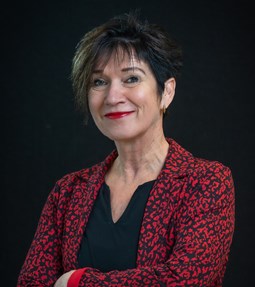When people with Alzheimer's are restless or feel anxious, lonely or sad, it is nice to talk to a trusted person. In such situations, the voice of a family member gives peace, calms and breaks loneliness. Unfortunately this is not possible every moment of the day.
Jelle Hylarides also experienced this. His mother has Alzheimer's disease. He noticed that the phone conversations with her son made her very happy and calm. Certainly at the difficult moments he wanted to be there for her more often. Within Medical Delta Living Lab Care Robotics, The Hague University of Applied Sciences and care institution Pieter van Foreest, the institution where his mother lives, helped him with the development and testing of Care-Riing, an interactive system that makes this possible.
Conversation as medication
Because it is practically impossible for a family to be available at any time of the day and the nursing staff has to deal with increasing workload, they have to use sedative medication more often than they would like when people with Alzheimer's become very restless. Care-Riing offers Alzheimer patients more quality of life. The conversations with family members give peace and thus prevent possible escalation, which means that medication may need to be used less often.
Care-Riing can be seen as a smart answering machine that simulates telephone conversations with family members. Hylarides noticed that his mother always asked the same questions and always came up with the same subjects. This formed the basis for the idea. Healthcare providers can have people with Alzheimer's disease call Care-Riing at any time of the day, allowing them to relax and feel better. It is not a substitute for actual meetings and conversations, Hylarides emphasizes, but above all "an addition and a necessary supplement for the times when it is needed."
"Jelle had completely thought out the idea and design, but lacked the technical know-how to develop it," says Dr. Hani Al-Ers. As a researcher within the Technology for Health research group and teacher of Software Engineering at The Hague University of Applied Sciences, he is closely involved in the project. Students from the Research & Development minor of The Hague University of Applied Sciences started using it and eventually made a prototype for the first tests in practice. “Together with Care-Riing, a version was created in which the system listens and interprets what is being said. This makes it possible for the system to have an ongoing conversation in which the recorded voice of a family member answers questions and addresses topics that are pleasant for the person with Alzheimer's. ”
Personal history
The latter was quite a challenge, says Al-Ers, because a conversation can suddenly take a turn. “A pleasant conversation about personal history, for example about how nice it was to live in a certain neighborhood, can turn when someone with Alzheimer's, for example, says they want to go home immediately. The system must anticipate and respond appropriately. One of our students has now made that possible. Furthermore the system must be able to demonstrate that it listens by giving short responses such as "hmhm", "yes", or "I understand."
This also means a lot to healthcare institutions: if the trusted voice of a family member is available for a pleasant conversation at any time of the day, the care will change.
The newest prototype of Care-Riing was also tested by Pieter van Foreest. The caretakers of Hylarides' mother noted how she reacted to the conversations. The results are all neutral to positive. The caregivers and involved psychologist at the institution are also enthusiastic about the tests, just as the students involved enjoyed participating in the development. "It is good to see how we, as a university of applied sciences, have been able to make something together with students, an entrepreneur and a healthcare institution within a Living Lab. An outcome that potentially has meaning for a very large group of people," says Al-Ers.
Conversation techniques
People with Alzheimer's often live in the moment. Also shortly after they have had a nice and good telephone conversation, the mood can suddenly change. Hylarides wants to find out what the good moments are for Care-Riing to turn emerging unrest into a positive feeling. “This also means a lot to healthcare institutions: if the trusted voice of a family member is available for a pleasant conversation at any time of the day, the care will change. We would like to test the system on a larger scale to find the best applications. ”
The conversation itself is also part of the solution, says Hylarides. Having a nice conversation with someone with Alzheimer's requires certain conversation techniques. Questions such as "what did you do today" or "what did you eat" are often asked, but are difficult for someone with Alzheimer's to answer. What they can talk about are nice memories from a distant past or about the here and now, such as the weather. “We can coach family members.” Hylarides hopes that the system can also eventually alarm if something is said about medication or when someone starts crying. “As family members you want to know and be there at those moments. Hopefully Care-Riing can also support this. "
But first the pilot version of Care-Riing is being tested on several people with Alzheimer's and their families. Al-Ers: "Ultimately, we hope to make a solution that gives many people with Alzheimer's and their families a better life and can bring peace when it is needed."

